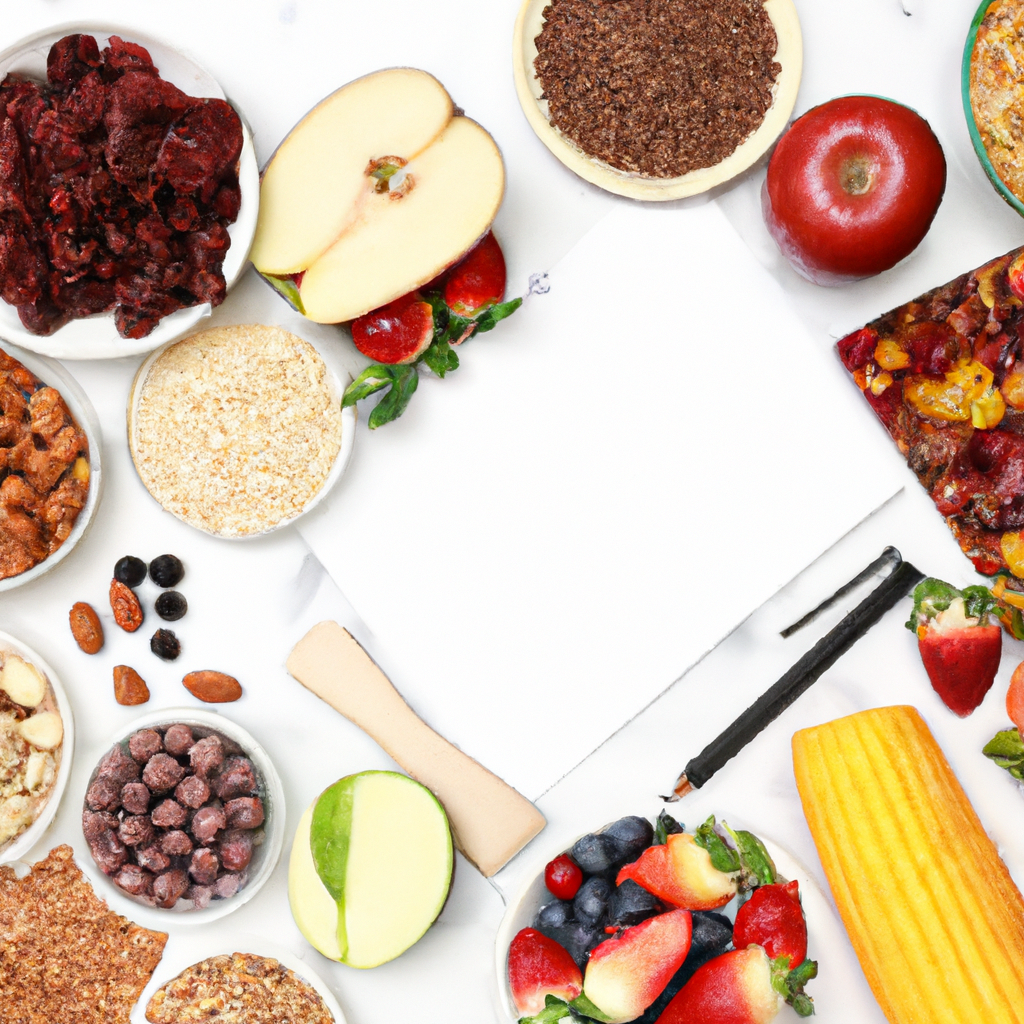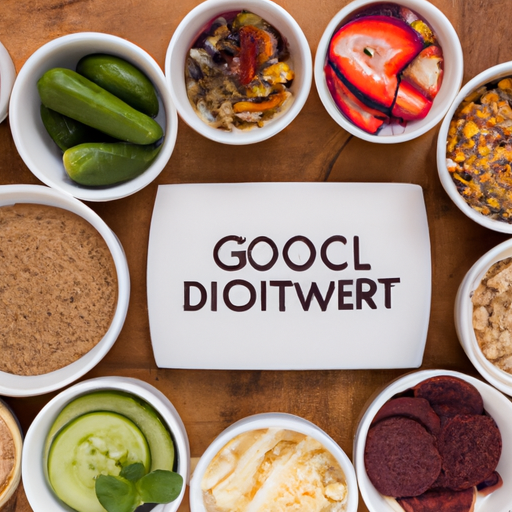Do you want to lead a healthier life? Perhaps a good place to start would be to ensure a balanced and healthy digestive system. Carefully selecting the right types of food can give your digestive system a helping hand and provide you with a host of health benefits. In this article, we’ll be exploring a range of good digestive foods that can help keep your gut feeling happy, healthy, and balanced.
1. Feeding Your Gut With Super-powered Foods
Wouldn’t it be nice to give your gut some extra care? Well, that’s exactly what certain amazing super-foods can provide. We’ve picked out some of the most powerful ingredients that can help nourish your gut’s bacterial balance and support your digestive health.
- Yogurt – packed with beneficial bacteria and probiotics, yogurt can help improve digestion and support your immune system.
- Berries – blueberries, blackberries, strawberries, raspberries and other brightly coloured berries are filled with antioxidants and fibre to help promote good digestion.
- Garlic & Onions – crunchy and flavourful, onions and garlic are rich in prebiotics to help feed the good bacteria in your gut.
- Greens – leafy greens are jammed full of vital vitamins and minerals to help support a healthy gut.
In addition to these highly nourishing super-foods, adding fermented foods like sauerkraut, kombucha, kimchi and miso to your diet can also be incredibly beneficial for your digestive wellbeing. Plus, healthy fats are also a key part of a strong and balanced gut.
2. Quality Ingredients For A Balanced Belly
A balanced belly starts with the quality ingredients that you put in. To achieve that balance, make sure you always opt for fresh and nutrient-dense ingredients. Here are 5 ingredients you need to make sure are in your kitchen:
- Fruits & Vegetables: Fresh produce provides essential vitamins, minerals, probiotics, and antioxidants your body needs. Try to incorporate an assortment of colours in your meals.
- Whole Grains: If you want a fuel-filled belly, whole grains are your go-to! These provide fibre and energy that will help keep you feeling full and energised.
- Protein: Lean proteins provide essential nutrients like iron, chances are you’ve heard of it! Combine your proteins with other ingredients like whole grains and vegetables for ultimate meals.
- Legumes: A great source of vegan protein and heart-healthy fibre, legumes are a simple and filling culinary delight. Incorporating these into your diet on a weekly basis is a must.
- Healthy Oils: Sadly, no meal is complete without oil! Make sure you opt for healthy and natural oils like olive, avocado, and coconut to fuel your meals.
Creating recipes with these ingredients are a sure-fire way to ensure you have the balanced belly you’ve been wishing for. Yummy, nutritious recipes are easy to achieve once these ingredients are in your pantry. Start planning your meals today!
3. Optimal Nutrients For A Healthy Gut
A healthy gut contributes to overall health and well being. The food you eat plays an essential role in maintaining a healthy gastrointestinal system. Eating a variety of nutrient-rich foods can help support digestion and balance the good and bad bacteria in your intestine.
- Fiber: Eating plenty of high-fiber foods helps draw water into your intestines, and adding bulk to feces, making elimination easier. Foods high in fiber include legumes, fruits, vegetables, whole grains, and nuts.
- Probiotics: Probiotics are beneficial bacteria that help maintain the balance in your intestine and settle the stomach. Foods like yogurt, kefir, sauerkraut, miso and kimchi contain beneficial probiotics to help promote healthy digestion.
- Protein: Eating enough protein helps replace and repair gut cells. Sources of protein like red meat, poultry, seafood, eggs, dairy, plant-based proteins, and tempeh are all essential for maintaining intestinal health.
- Healthy fats: Unsaturated fats help protect your gut from oxidative damage and inflammation. Foods like olives, avocados, nuts, and seeds are all sources of good fats.
- Antioxidants: Consumption of antioxidant-rich foods helps reduce inflammation and protect the lining of your gut. Berries, green tea and dark chocolate are all full of antioxidants.
A well balanced diet rich in the aforementioned nutrients is essential for healthy digestion and building a strong intestinal system. Making sure you are mindful of the foods you eat and including a variety of nutritious options, one can maintain a happy and healthy gut.
4. Nourishing Your Gut For A Harmonious Digestive System
It is essential to provide your gut with the right kinds of nutrients to ensure balance and good digestive functioning. Here are 4 effective ways to nourish your gut flora:
- Eat more prebiotics and probiotics: Consuming probiotic-rich foods such as sauerkraut, kimchi, kefir, and yogurt, and prebiotic-containing foods like onions, garlic, and asparagus will nourish the gut microbiome to promote digestion and overall gut health.
- Drink plenty of water: Water is essential for hydration and digestion, so make a habit to drink at least eight glasses of water every day.
- Eat fiber-rich foods: Include a variety of nondigestible carbohydrates, such as beans, oat bran, and nuts for aiding in digestion, as well as maintaining good gut bacteria.
- Replace processed foods with whole foods: Reduce the intake of processed food from your diet and replace it with whole foods. This will reduce the amount of sugar and chemicals in your system, and provide your gut with essential nutrients that are vital for proper digestion.
Additionally, you should reduce the quantity of stress in your life to avoid the negative impact it can have on your gut health. Make sure to get enough restful sleep, practice mindfulness, and manage your stress levels for a harmonious digestive system.
Q&A
Q: What are some good foods for digestion?
A: Eating foods that are high in fiber, such as whole grains, legumes, fruits, and vegetables, is an important part of maintaining healthy digestion. Additionally, probiotics, or live bacteria, can be found in foods like yogurt, kimchi, kombucha, and sauerkraut, and these can help boost your gut health. Additionally, fermented foods like miso, tempeh, and pickles are great sources of probiotics and can help keep your gut balanced.
Q: Can diet have an impact on digestive issues?
A: Absolutely! A balanced, nutrient-rich diet can provide the vitamins and minerals needed to keep your gut healthy and to help support healthy digestion. People with digestive issues may find that certain foods worsen their symptoms, so following a diet with some trial and error may help to identify problem foods. Additionally, adding foods that are rich in fiber can help to increase the amount of beneficial bacteria in your gut.
Q: What are some other tips for improving digestive health?
A: In addition to eating a balanced diet that includes plenty of fiber, staying hydrated and exercising regularly are excellent ways to keep your digestive system functioning properly. Additionally, reducing your stress levels, following a routine dietary schedule, and getting enough sleep can all help to ensure that your gut is healthy and balanced.
Why not explore the world of holistic digestive foods and discover what your gut needs? Eating foods that are delicious and nutritious can benefit your gut in many ways. Balance and variety are the keys to better digestion and a happy gut. Bon Appetit!
Achieving and maintaining a balanced gut microbiota is key to a happy and healthy digestive system. The gut microbiota affects the entire body, therefore having a healthy digestive system directly impacts overall health. A balanced gut microbiota is composed of a range of different microorganisms that work together to regulate digestion, immunity and even our emotional state. Luckily, there are a number of foods that can help promote a healthy gut.
Eating high-fiber foods is essential for digestive health. Fiber, which cannot be broken down by the body, helps increase stool bulk, which allows food to pass through the gastrointestinal tract more easily. Some excellent sources of dietary fiber include legumes, berries, green leafy vegetables, whole grains, and nuts. Eating these foods can help to keep the colon clean and in optimum shape.
Another way to boost gut health is by consuming probiotics. Probiotics are beneficial bacteria that help improve digestibility, support a healthy immune system, and protect the body from harmful bacteria. Common sources of probiotics include yogurt, kefir, and fermented foods such as sauerkraut, kimchi, and pickles. These foods are rich in beneficial bacteria and can help restore and maintain the balance of the gut microbiome.
Including healthy fats in the diet is also beneficial for gut health. Healthy fats can help reduce inflammation, decrease the risk of certain diseases, and regulate digestion. Good sources of healthy fats include avocados, olive oil, fatty fish, nuts, and seeds. Incorporating these sources of fat into meals and snacks can help keep the digestive system running smoothly.
Finally, consuming foods rich in prebiotics is essential for intestinal health. Prebiotics are non-digestible food components that feed beneficial bacteria in the digestive system, helping to create a healthy balance of flora in the gut. Some great sources of prebiotics include onions, garlic, bananas, asparagus, and wholegrains.
Making small dietary changes like these can make a big difference for gut health. Eating good-quality digestive foods is key to promoting a happy and balanced gut, and is essential for overall wellness and wellbeing.
